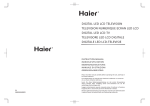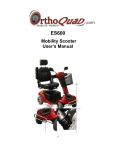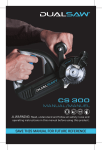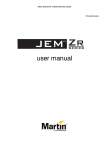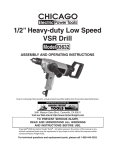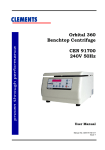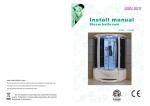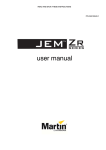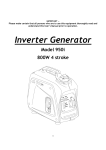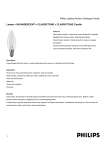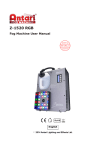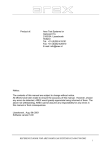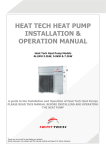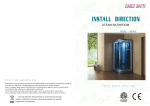Download RS1200 - Menards
Transcript
RS1200 OWNERS’ MANUAL WARNING: Read, understand and follow all safety rules and operating instructions in this manual before using this product. SAVE THIS MANUAL FOR FUTURE REFERENCE TABLE OF CONTENTS Introduction ......................................................................................................... 1 Warranty .............................................................................................................. 1 Product Registration ............................................................................................ 2 General Safety Rules ............................................................................................ 2 Specific Safety Rules ............................................................................................ 5 Symbols ............................................................................................................... 8 Features ............................................................................................................. 9 Assembly ............................................................................................................ 11 Operation ........................................................................................................... 14 Maintenance ...................................................................................................... 19 Parts List .............................................................................................................. 20 Customer Service ............................................................................................... 22 INTRODUCTION The DUALSAW® RS 1200 has many special features that make this tool different from other reciprocating saws. Please read and understand this manual before using this product. WARRANTY DUALSAW® – LIMITED ONE YEAR WARRANTY This warranty covers all defects in workmanship or materials in your DUALSAW® for a period of one year from the date of purchase. This warranty does not cover blades. HOW TO GET SERVICE Return the DUALSAW® RS 1200, properly packaged and postage prepaid to our Authorized Service Center. You can obtain the location of the Center by calling 1‑855‑382‑5729. When you request warranty service, you also must present proof of purchase documentation, which includes the date of purchase (sales receipt). We will repair any faulty workmanship, and either repair or replace any defective part, at our option. We will do so without any charge to you. We will complete the work within 90 days or less. WHAT IS NOT COVERED This warranty applies only to the original purchaser and may not be transferred. This warranty only covers defects arising under normal usage and does not cover any malfunction, failure, or defects resulting from misuse, abuse, neglect, alteration, modification, or repairs by other than the Authorized Service Center. Infusion Brands, Inc. makes no warranties, representation, or promises as to the quality or performance of its power tools other than those specifically stated in this warranty. 1 PRODUCT REGISTRATION To get information on product updates, special offers, and warranty claims, register your DUALSAW® RS 1200 on our website www.DualSaw.com Here is what you will need: • Sales Receipt • Machine Serial Number (located on the underside of the saw body) serial number GENERAL SAFETY RULES WARNING! Read, understand, and follow all safety rules and operating instructions in this manual before using this product. Failure to follow all rules and instructions listed below may result in electric shock, fire, and/or serious personal injury. SAVE THESE INSTRUCTIONS WORK AREA •Always keep your work area clean and well lit. Cluttered benches and dark areas invite accidents. •Do not operate power tools in explosive atmospheres, such as in the presence of flammable liquids, gases, or dust. Power tools create sparks, which may ignite the dust or fumes. •Keep bystanders, children, and visitors away while operating a power tool. Distractions can cause you to lose control. GENERAL SAFETY RULES ELECTRICAL SAFETY •Avoid body contact with grounded surfaces such as pipes, radiators, ranges, and refrigerators. There is an increased risk of electric shock if your body is grounded. •Do not expose power tools to rain or wet conditions. Water entering a power tool will increase the risk of electric shock. If operating the power tool in damp locations is unavoidable, a Ground Fault Circuit Interrupter must be used to supply the power to your tool. Use electrician’s rubber gloves and footwear to further enhance your personal safety in damp conditions. •Do not abuse the cord. Never use the cord to carry the tool or to pull the plug. Keep cord away from heat, oil, sharp edges, or moving parts. Contact Customer Service if cord is damaged and do not use the saw. Damaged cords increase the risk of electric shock. •Do not use tool if saw does not turn “ON” or “OFF”. Any tool that cannot be controlled with the trigger switch is dangerous and must be repaired. •When operating a power tool outside, always use an outdoor extension cord with a minimum 13 amperes fuse. These cords are rated for outdoor use and reduce the risk of electric shock. The use of any extension cord will cause some loss of power. To keep the loss at a minimum and to prevent overheating, use an extension cord that is heavy enough to carry the current that the tool will draw. For recommended sizes of extension cords refer to the following table. Minimum Gauge Extension Cord (AWG) Volts Total Length of Cord 120v 0 to 25 ft 26 to 50 ft 51 to 100 ft 101 to 150 ft 240V 0 to 50 ft 51 to 100 ft 101 to 200 ft 201 to 300 ft Ampere Rating AWG AWG AWG AWG More than 0 Not more than 6 18 16 16 14 More than 6 Not more than 10 18 16 14 12 More than 10 Not more than 13 16 16 14 12 More than 13 Not more than 16 14 12 Not Recommended Note: The extension cord must have adequate wire size AWG (American Wire Gauge) for safe, efficient use. Smaller gauge wires have greater capacity (16 gauge wire has more capacity than 18 gauge wire). 2 3 GENERAL SAFETY RULES GENERAL SAFETY RULES PERSONAL SAFETY SERVICE •Stay alert. Watch what you are doing and use common sense when operating a power tool. Do not use the tool while tired or under the influence of drugs, alcohol, or medication. A moment of inattention while operating power tools may result in serious personal injury. •Dress properly. Do not wear loose clothing or jewelry. Keep your hair, clothing, and gloves away from moving parts. Loose clothes, jewelry, or long hair can be caught in moving parts. Wear protective hair covering to contain long hair. •Keep handles dry, clean and free from oil and grease. Rubber gloves and nonskid footwear are recommended when working outdoors. •Avoid accidental starting. Carrying tools with your finger on the switch or plugging in tools that have the switch in the “ON” position invites accidents. •Do not overreach. Keep proper footing and balance at all times. Proper footing and balance enables better control of the tool in unexpected situations. •Use safety equipment. Always wear eye protection. Dust mask, non-skid safety shoes, hard hat, or hearing protection must be used for appropriate conditions. •Tool service must be performed only by qualified repair personnel. Service or maintenance performed by unqualified personnel could result in a risk of injury. Contact Customer Service for information for repairs. TOOL USE AND CARE •Always use clamps or other practical ways to secure and support the workpiece to a stable platform. Holding the material in your hand or against your body is dangerous and may lead to loss of control. Hold the tool firmly to prevent loss of control. •Do not force the tool. Use the correct tool for your application. The correct tool will do the job better. •Disconnect the plug from the power source before making any inspections or adjustments, changing blades, or storing the tool. Such preventative safety measures reduce the risk of starting the tool accidentally. •Store idle tools in a dry and secure place, out of reach of children and other untrained persons. Tools are dangerous in the hands of untrained users. • Maintain tools with care. Properly maintained tools with sharp cutting edges are less likely to jam and are easier to control. Develop a periodic maintenance schedule for your tool. • Check for misalignment or binding of moving parts, breakage of parts, and any other condition that may affect the tool’s operation. If damaged, contact Customer Service before using. Any alteration or modification is a misuse and may result in a dangerous condition. 4 •When servicing a tool, always use only identical replacement parts. Follow instructions in the maintenance section of this manual. Use of unauthorized parts or failure to follow maintenance instructions may create a risk of electric shock or injury. Certain cleaning agents such as gasoline, carbon tetrachloride, ammonia, etc. may damage plastic parts. DO NOT TOUCH ANY MOVING PART WHEN THE SAW IS RUNNING Blades may be hot after use. Use caution when changing blades SPECIFIC SAFETY RULES KEEP HANDS AWAY FROM CUTTING AREA AND BLADE •Always keep both hands on the saw. When both hands are holding the saw, they cannot be cut by the blade. •Keep your body positioned to either side of the saw blade, but not in line with the saw blade. Hold the saw firmly to prevent loss of control. Do not reach underneath the material being cut. •While operating, always keep the cord away from the cutting area. •Never hold the workpiece being cut in your hands or across your leg. It is important to support the material properly to minimize body exposure, blade jamming, or loss of control. •Always hold tool by the insulated gripping surfaces when performing an operation where the cutting tool may contact hidden wiring or its own cord. Contact with a “live” wire will make exposed metal parts of the tool “live” and shock the operator. •Do not turn the saw on while carrying it. Accidental contact with the saw blade could result in serious personal injury. •Periodically remove the blades, clean the saw with a cloth or blow it clean with compressed air. 5 SPECIFIC SAFETY RULES SPECIFIC SAFETY RULES HOW TO AVOID KICKBACK ADDITIONAL SAFETY RULES Kickback is a sudden reaction to a pinched, bound, or misaligned saw blade, causing the saw to lift up and out of the workpiece and toward the operator. When the blade is pinched or bound tightly by the kerf closing down, the blade stalls and the motor reaction drives the unit rapidly back toward the operator. If the blade becomes twisted or misaligned in the cut, the teeth at the back edge of the blade can dig into the workpiece causing the blade to kickback. Kickback is the result of tool misuse and/or incorrect operating procedures or conditions and can be avoided by taking proper precautions as given below: • Maintain a firm grip with both hands on the saw and position your body and arm to allow you to resist kickback forces. Kickback forces can be controlled by the operator, if proper precautions are taken. • Support large panels to minimize the risk of blade pinching and kickback. Large panels tend to sag under their own weight. Supports must be placed under the panel on both sides, near the line of cut and near the edge of the panel. •Do not use dull or damaged blades. Unsharpened or improperly set blades produce a narrow kerf causing excessive friction, blade binding, and kickback. •Use extra caution when making a “plunge cut” into existing walls or other blind areas. The protruding blade may cut objects that can cause kickback. •Guard against kickback if the blade binds or the saw stalls and is rapidly driven back towards the operator, release trigger switch immediately. Do not force tool. Stay alert and exercise control. •Be sure to read and understand all instructions. Failure to follow all instructions listed below may result in electric shock, fire, and/or serious personal injury. •Know your power tool. Read operator’s manual carefully. Learn the applications and limitations, as well as the specific potential hazards related to this tool. •Always wear safety glasses or eye shields when using this saw. Everyday eyeglasses have only impact-resistant lenses; they are NOT safety glasses. •Always protect your lungs. Wear a face mask and dust mask if the operation is dusty. •Always protect your hearing. Wear protection during extended periods of operation. •Inspect the tool’s cord periodically and if damaged, contact Customer Service. •Check for damaged parts. Before using the tool, inspect all parts for damage to determine if it will operate properly and perform its intended function. Check for misalignment or binding of moving parts, breakage of parts, and any other condition that may affect the tool’s operation. A guard or other part that is damaged should be properly repaired or replaced. Contact Customer Service. WARNING! Some dust created by using power tools contains chemicals that may cause cancer, birth defects, or reproductive harm. Some examples of these chemicals are: • Lead from lead-based paints WARNING! • Do not let familiarity with your saw make you careless. Remember that a careless fraction of a second is sufficient to cause severe injury. • Crystalline silica from bricks and cement and other masonry products, • Only use blades specially designed for this saw. Other blades will not operate safely and could result in serious personal injury. To reduce your exposure to these chemicals: work in a well ventilated area, and work with approved safety equipment, such as those dust mask that are specially designed to filter out microscopic particles. • If the blades come in contact with the workpiece before they reach full speed, it could cause the saw to kickback toward you resulting in serious injury. 6 • Arsenic and chromium from chemically treated lumber. 7 FEATURES SYMBOLS Some of the following symbols may be used on this tool. Proper interpretation of these symbols will allow you to operate the tool better and safer. SYMBOL NAME Volts Amperes Hertz Watt Minutes DESIGNATION/EXPLANATION Voltage Current Frequency Power 12 A Current Input 120 V, 60 Hz AC Adjustable Stroke Length Short: 3/4” (20mm) Long: 1-1/4” (30mm) Stroke Speed 0-2400 spm Net Weight 10.4 lbs (4.7 kg) Power stroke key Time Alternating Current Type of Current Direct Current Type of Current No Load Speed Rotational speed at no load Class II Construction Double-insulated construction Per Minute Revolutions or strokes per minute Wet Conditions Alert Do not expose to rain or use in damp areas. Read User Manual To reduce the risk of injury, user must read and understand user’s manual before using the product. Eye Protection Always wear safety goggles or safety glasses with side shields. Face Mask Wear full-face mask when operating this product. Ear Protection To protect your ears from noise, always wear ear protectors or ear plugs. Gloves PRODUCT SPECIFICATIONS Always wear gloves when operating this product. No Hands Symbol Failure to keep your hands away from the blades will result in serious injury. Danger Indicates an immediate hazardous situation. Must avoid to prevent death or serious injury. Warning Indicates a potentially hazardous situation, which, if not avoided may result in serious injury. Caution Indicates a potentially hazardous situation, which, if not avoided may result in minor injury. 8 Quick Blade Change access area cover 180o rotating handle release light switch lock-on button live tool indicator shoe assembly trigger switch with speed dial KNOW YOUR DUALSAW RS 1200 Before attempting to use this tool, familiarize yourself with all operating features and safety rules. L i v e To o l I n d i c a t o r The indicator is located on the saw’s handle facing toward you. The indicator lights when the saw is connected to a power supply. Light Switch Your saw is equipped with two LED lights in its nose to provide supplemental illumination on the cutting surface. Press the button on the top of the handle to turn the lights on. Press the button again to turn the lights off. 9 FEATURES Tr i g g e r S w i t c h w i t h Va r i a b l e S p e e d D i a l ASSEMBLY UNPACKING The pressure switch in the handle turns the saw ON and OFF. To turn your reciprocating saw ON, depress switch trigger. Release switch trigger to turn your saw OFF. The speed of the reciprocating saw blade can be adjusted by turning the variable speed dial on the trigger. Turn the dial clockwise (right) to increase the speed; turn the dial counter-clockwise (left) to decrease the speed. The blade stroke rate may be adjusted during cutting operation by presetting the dial on or between any one of the six letters. •Carefully remove the tool and any accessories from the box. Make sure that all the items listed in the packing list are included. •Inspect the tool carefully to make sure no damage occurred during shipping. •Do not discard packaging material until you have carefully inspected and satisfactorily operated the tool. •If any parts are damaged or missing please call 1-888-760-4405 for assistance. Setting SPM rating (strokes per minute) PACKING LIST A-B Low stroke | C-D Medium stroke | E-F High stroke Higher speed settings are generally used for fast cutting or when cutting softer materials such as wood, composite materials, and plastics. Slower speed settings are generally used when precision is required or when cutting harder materials. Materials typically cut using slower speeds include sheet metal, conduit, and pipe. Lock-On Button Your saw is equipped with a lock-on feature, which is convenient when continuous cutting for extended periods is required. The lock-on button is located on the side of the handle. To lock-on, depress the trigger switch, press and hold the lockon button, and then release the trigger switch and lock-on button. Your saw will continue running. To release the lock, depress the trigger switch and release it. Shoe Assembly The shoe pivots up and down, allowing you to position the saw so that its blade teeth are at different angles with respect to the cutting surface. In addition, the shoe can be moved in or out to adjust the depth to which the saw blade cuts. Quick Blade Change Access Area The Quick Blade Change (QBC) lock eliminates the need for tools when changing the blade. Lift the QBC access area cover to access the blade lock. Open the lock to insert/release a blade; close the lock to hold the blade firmly in place. 180o Rotating Handle Release The housing assembly can be rotated 180o with respect to the saw handle. Pull back on the handle release latch to rotate the assembly; release the latch to lock the housing assembly in place. The handle locks in place every 45o. •DUALSAW® RS 1200 •Saw Blades (multi-purpose) •Allen Wrench •Saw Case •Owner’s Manual WARNING! • If any parts are missing or damaged, do not operate the saw until missing parts are replaced. Failure to do so could result in serious personal injury. • Do not attempt to modify the saw or create accessories not recommended for use with it. Any such alteration or modification is misuse and could result in a hazardous condition and could result in serious personal injury. • To prevent accidental starting that could cause serious personal injury, always unplug the saw when assembling parts. WARNING! The operation of any power tool can result in foreign objects flying into your eyes. Always wear safety goggles, safety glasses with side shields, or a full face mask, as appropriate. Stroke Key The DUALSAW® RS1200provides two stroke length options: short (.75”, 20mm); long (1.125”, 30mm). Use the stroke key on the top of the handle to select the stroke length. Choose the stroke length that is most appropriate for the job (e.g., short stroke for metal, tight space, plunge cuts; long stroke for wood). 10 11 ASSEMBLY ASSEMBLY ELECTRICAL CONNECTION Your saw has a precision-built DUALSAW® electric motor. It should be connected to a power supply that is 120 volts, 60 Hz, AC only (normal household current). A voltage drop of more than 10 percent will cause a loss of power and the motor will overheat. If your saw does not operate when plugged into the outlet, check the power supply. Do not operate this saw on direct current (DC). APPLICATIONS Use the DUALSAW® RS 1200 to cut: •All types of wood products (e.g., lumber, plywood, paneling, composition board, and hard wood) •Masonite •Plastic •Drywall •Metals (e.g., sheet steel, pipe, steel rods, aluminum, brass, and copper) INSTALLING BLADES The DUALSAW® blade change system eliminates the need for tools when changing the blade. To i n s t a l l a b l a d e : 1. Unplug the saw 2. Lift the Quick Blade Change (QBC) access hatch Note: Inserting the blades is easiest when the reciprocating arms are even 3. Unlock the blade levers by rotating both levers to the down position 4. Insert the DualSaw blades until fully seated 5. Lock the blades in place by rotating both lock levers to the up position 6. Pull on the ends of the DualSaw blades to ensure they properly locked in place Note: You may hear a clicking sound which indicates the blades are locked in place 7. Allow the QBC access hatch to close SELECTING BLADES Selecting the correct type of blade is important in order to obtain the best performance from your saw. Select the blade based on the application and on the material you wish to cut. Selecting the right blade will give you a smoother, faster cut and prolong the life of the blade. Blades with fewer teeth, 10 teeth per inch (TPI) are typically used for cutting wood, while blades with more teeth are better for cutting metal or plastic. We recommend 12 TPI for plastics and soft metals. blade lever lock blade tang pocket lever moves to lock/ unlock QBC QBC access area cover lock lever indicator WARNING! The DUALSAW® RS 1200 uses specially designed blades. Never use other types of blades on this saw. Other blades will not operate safely and could result in serious personal injury. WARNING! Be sure to first unplug the electric cord from the electrical outlet and allow blades to cool before removing blades. 12 13 OPERATION OPERATION SETTING THE STROKE LENGTH You can adjust the stroke length of your DUALSAW® RS 1200 — short: 3/4” (20mm) or long: 1-1/4” (30mm). Move the stroke selection switch to the desired length. WARNING! Blades longer than 6” (15.2cm) can whip and should not be used for plunge cutting. Failure to heed this warning can result in serious personal injury. SETTING THE ANGLE OF THE BLADE HOUSING For some workpieces, making a cut would be easier if the blade was at an angle with respect to the handle. This position would allow you to hold the saw in a comfortable position and cut at a diagonal. The DUALSAW® RS 1200 features a housing that can rotate up to 180o to provide you with the best cutting orientation. ADJUSTING THE SHOE ASSEMBLY The DUALSAW® RS 1200 is equipped with an adjustable shoe to make it easier for you to hold the saw and make a clean cut. The shoe can be rotated to adjust the blade angle and/or extended to adjust the blade depth. To a d j u s t t h e b l a d e a n g l e : 1. Push/pull on the end of the shoe to set the desired angle. 2. Tilt the saw until the blade is perpendicular to the workpiece. 3. Make sure the teeth of the blade are at the correct position. To r o t a t e t h e h o u s i n g : 1. Pull back on the DUALSAW® 180o rotating handle release latch with your thumb and hold it. 2. Hold the handle and rotate the housing to the desired position (the housing locks in place every 45o). 3. Release the latch to secure the housing in the set position. To a d j u s t t h e b l a d e d e p t h : 1. Set the stroke length – short or long (see previous procedure). 2. Loosen the two Allen-head set screws in the bottom of the saw nose. 3. Move the shoe assembly in/out to set the desired depth of the cut. 4. Tighten the set screws. Note: The dual-stroke feature of the DUALSAW RS 1200 blade almost entirely eliminates the need to adjust the shoe. 14 15 OPERATION OPERATION TURNING THE SAW ON/OFF Plunge Cutting Wood or Wall Board • To turn the saw on: Depress the switch trigger. • To turn the saw off: Release the switch trigger. • To adjust stroke speed: The speed of the reciprocating saw blade can be adjusted by turning the speed dial on the trigger. Turn the dial clockwise (right) to increase the speed; turn the dial counter-clockwise (left) to decrease the speed. 1. Clamp the workpiece so it will not move during the cut. 2. Mark the line of cut clearly on the workpiece. 3. Make sure the saw blade is clear of any foreign material and that the power cord and extension cord are out of the blade path. 4. Hold the saw firmly in front of and clearly away from you. 5. Set a slow stroke speed and the stroke lengh to “short”. Depress the trigger switch to start the cutting action. Move the blade into the workpiece and move the saw to vertical with the shoe firmly against the workpiece. Note: Once the plunge cut into the workpiece is complete, change the stroke length to “long” and increase the stroke speed for a faster cut. The saw must come to complete stop before the switching stroke length. OPERATING THE SAW General Cutting 1. Mark the line of cut clearly on the workpiece. 2. Hold your saw firmly in front of and clearly away from you. 3. Make sure saw blade is clear of any foreign material and that power cord and extension cord are out of the blade path. Note: Be sure material to be cut is held firmly. Small workpieces should be securely clamped in a vise or with clamps to the work bench. 6. Set the shoe assembly against the workpiece and angle the blade tip to touch the workpiece (approximately 45o ). 7. Apply steady and even pressure when making a cut. Note: Do not force. Use only enough pressure to keep the saw cutting. Let the blade and saw do the work. Forcing the saw causes rough cuts, shortens the life of the saw, and could cause a kickback. 4. Place the shoe against the workpiece and the blade over the cut line. 5. Set the stroke speed and depress the trigger switch to start the cutting action. Move the blade against the workpiece. Note: Keep pressure on the shoe against the workpiece. Do not force. Use only enough pressure to keep the saw cutting. Let the blade and saw do the work. 16 17 OPERATION MAINTENANCE GENERAL MAINTENANCE WARNING! Cutting into electrical wiring can cause the blade and saw housing to become electrically live. Do not touch metal parts when cutting into a wall; grasp only the insulated surfaces on the saw. Make sure hidden electrical wiring, water pipes, and mechanical hazards are not in the blade path when cutting into a wall. Metal Cutting You can cut metals such as sheet steel, pipe, steel rods, aluminum, brass, and copper with your DUALSAW® RS 1200. 1. Mark the line of cut clearly. 2. Clamp the workpiece so it will not move during the cut. Cut close to the clamping point to eliminate any vibration of the work. Note: When cutting conduit pipe or angle iron, clamp the workpiece in a vise, if possible, and cut close to the vise. To cut thin sheet material, “sandwich” the material between hardboard or plywood and clamp the layers to eliminate vibration and material tearing. 3. Make sure the saw blade is clear of any foreign material and that the power cord and extension cord are out of the blade path. 4. Hold the saw firmly in front of and clearly away from you. 5. Depress the switch trigger to start the cutting action. 6. Apply steady and even pressure when making a cut. 18 •Tool service must be performed by qualified repair personnel. Service or maintenance performed by unqualified personnel could result in a risk of injury. Contact Customer Service for information on repairs. •When servicing a tool, always use only identical replacement parts. Use of unauthorized parts or failure to follow maintenance instructions may create a risk of electric shock or injury. •Use a clean cloth to remove dirt, dust, etc. Avoid using solvents when cleaning plastic parts. Most plastics are susceptible to damage from various types of commercial solvents and may be damaged by their use. •Electric tools are subject to accelerated wear and possible premature failure when they are used to work on fiber glass, wallboard, spackling compounds, or plaster. The chips and grindings from these materials are highly abrasive for electrical tool parts, such as bearings, brushes, commutators, etc. Consequently, clean the tool even more intensely after working these materials. LUBRICATION All of the bearings in this tool are lubricated with a sufficient amount of high grade lubricant for the life of the tool under normal operating conditions. Therefore, no further lubrication is required. BLADE MAINTENANCE •Do not use any blades other than the DUALSAW® RS 1200 blades which are specially designed for this tool. •Keep the blades sharp and properly set. Using a dull or damaged blade places a heavy load on your saw and causes excessive friction, blade binding, and kickback. Keep extra blades on hand, so sharp blades are always available. •Resin and other materials may become attached to the sides of the blade and cause the blade to overheat. This means that it can buckle or even split. Keep the blade clean. Wash it with a solvent. Never try to scrape the blade clean with a hard object. 19 PARTS LIST PARTS LIST WARNING! When servicing, use only identical replacement parts. Use of other parts may create a hazard or cause product damage. Contact customer service at 1‑855‑382‑5729 for information on how to obtain replacement parts from an authorized service facility. Subject to change 20 no. Description qty no. Description qty no. Description qty 1 Gear box 1 39 Isolation washer 2 Bearing 1 40 Left LED cover 4 77 LED switch 1 1 78 Handle right 3 Gear unit 1 1 41 Pan head tap screw ST3x10F14 79 Indicator cover 4 Connecting rod 1 2 42 Housing torsional spring 1 80 Power on indicator 5 1 Bearing 2 43 Access cap 1 81 Pantap screw ST4x16F 4 6 Cam Pin 2 44 Right LED cover 1 82 Cord Clamp 1 7 Lower Cam 1 45 Right housing 1 83 Cord sheath 1 8 Cam coat 2 46Bearing 1 84 Pan tap screw ST3.5x19F 2 9 Cam bracket 1 47 Big gear clamp 3 85Cord 1 10 Upper cam 1 48 Hex socket screw M4x8 3 86 4.8 mother terminal 2 11 Bearing base 1 49 Shoe unit 1 87 Bearing seat 2 12Bearing 1 50 Hex socket screw M4x16 2 88 Brush lead(Blue) 1 13 Bearing clamp 2 51 Pan tap screw ST4x20F 9 89 Brush lead(White) 1 14 Hex socket screw M5x20 4 52 External circlip 1 90 Brass ferrule 2 15 Junction Plate 1 53Bearing 1 91 lead (red) 1 16 Cam clamp 1 54 Rotor bearing clamp 1 92 Antifriction mat 1 17 Hex socket screw M5x6 1 55Rotor 1 93Battery 3 18 Hex socket screw M5x10 2 56 Wind ring 1 94 Saw blade A 1 19 Slide way 1 57Bearing 1 95 Saw blade B 1 20 Hex socket screw M4X35 4 58 Rubber Bearing seat 1 96 Name label 1 21 Oval head rivets3x22 2 59 Pan tap screw ST4.2x58F 2 97 Parameter lable 1 22 Arm liner 2 60Stator 1 98 Long stroke lable 1 23 Arm rail 1 61 Motor housing 1 99 Short stroke lable 1 24 Hex socket screw M4X30 4 62 Carbon Brush 2 100LED Switch lable 2 25 Left knob 1 63 Brush holder 2 101Warning lable 1 26 Fast holder Left 1 64 Wire collector 1 102Isolation plate 1 27Spring 2 65 Handle left 1 103Brass ferrule 6 28 Lock pin 2 66 Lead wire clamp 2 104Pan tap screw M4x6 4 29 Quick clamp shell 2 67 Pan tap screw ST3.5x10F 3 105Allen Key 1 30 Fast holder Right 1 68 Battery box cap 1 106Hex socket tap screw M4x101 31 Right knob 1 69 Handle lock pin 1 107Battery box 1 32 Pan head tap screw ST4x25 4 70 Handle lock button 1 108Isolation cap 1 33 Pan head screw M3X6 2 71 Pan tap screw ST3x14F 1 109Seal ring 1 34 Hex socket screw M4X6 4 72 Handle lock spring 1 110Seal ring clamp 1 35 Needle bearing 2 73 Reversing switch 1 111 Hex socket tap screw M4x10 2 36 flat washer 4 2 74 LED switch button 1 37 Left housing 1 75 Main switch 1 38 LED board 2 76 battery shell 2 21 CUSTOMER SERVICE WARNING! If the replacement of the supply cord is necessary, this has to be done by the manufacturer or his agent in order to avoid a safety hazard. Should your DUALSAW® RS 1200 need repair parts or service, simply contact our Customer Service at 1‑855‑382‑5729. Be sure to provide all pertinent facts when you call. Also, you can check our website www.dualsaw.com for a list of frequently asked questions or e-mail us at [email protected]. The model and serial number of this saw will be found on the bottom of the saw housing. Please record the model number and serial number in the space provided below. When calling customer service, always give the following information: • Model Number: RS 1200 • Serial Number: ______________ Infusion Brands, Inc. Clearwater, Florida 33760 Phone: 1-855-382-5729 www.InfusionBrands.com DUALSAW ® is a registered trademark of Infusion Brands, Inc. 22 The DUALSAW range of revolutionary tools boast unique and patented dual blade technology, setting new standards in power cutting tools worldwide. The DUALSAW range of tools also includes counter rotating circular saw blade technology, allowing you to cut virtually any material without changing blades! PRECISION CS 300 Just the facts MOTOR POWER ......................4.5A/550W VOLTAGE ...................................120V / 60HZ BLADE DIAMETER .....................3 1/4” SPINDLE SPEED .........................8800RPM MAX CUTTING DEPTH ............3/4” WEIGHT ....................................4 lbs EVERYDAY CS 450 Just the facts MOTOR POWER ......................7.5A/1050W VOLTAGE ...................................120V / 60HZ BLADE DIAMETER .....................4 1/2” SPINDLE SPEED .........................5500RPM MAX CUTTING DEPTH ............1” WEIGHT ....................................61/2 lbs DESTROYER CS 650 Just the facts MOTOR POWER ......................13A/1550W VOLTAGE ...................................120V / 60HZ BLADE DIAMETER .....................6 1/4” SPINDLE SPEED .........................4200RPM MAX CUTTING DEPTH ............13/4” WEIGHT ....................................9 lbs For more information and to see the Dualsaw in action go to: www.DUALSAW.com
















